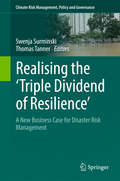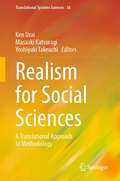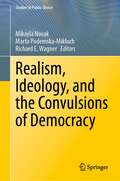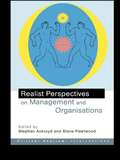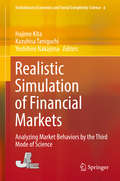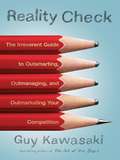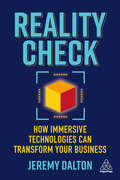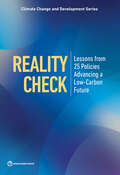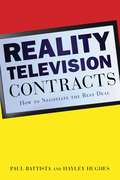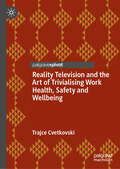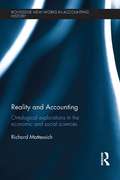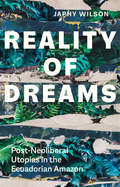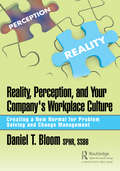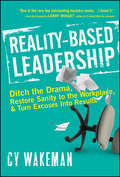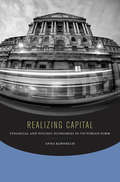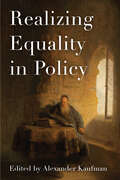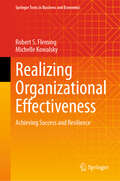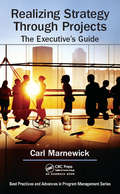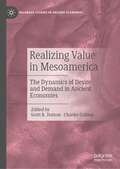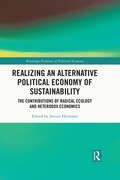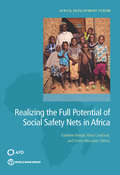- Table View
- List View
Realising the 'Triple Dividend of Resilience'
by Swenja Surminski Thomas TannerWhy aren't we investing more in disaster resilience, despite the rising costs of disaster events? This book argues that decision-makers in governments, businesses, households, and development agencies tend to focus on avoiding losses from disasters, and perceive the return on investment as uncertain - only realised if a somewhat unlikely disaster event actually happens. This book develops a new business case for investment based on the multiple dividends of resilience. This looks beyond only avoided losses (the first dividend) to the wider benefits gained independently of whether or not the disaster event occurs. These include unleashing entrepreneurial activities and productive investments by lowering the looming threat of losses from disasters and enabling businesses, farmers and homeowners to take positive risks (the second dividend); and co-benefits of resilience measures beyond just disaster risk (the third dividend), such as flood embankments in Bangladesh that double as roads, or wetlands in Colombo that reduce urban heat extremes.
Realism for Social Sciences: A Translational Approach to Methodology (Translational Systems Sciences #36)
by Yoshiyuki Takeuchi Ken Urai Masaaki KatsuragiThis book discusses the growing interest in realism in social sciences of the twenty-first century. The first part of this book provides recent discussions on realism in philosophy. The second part describes specific problems that have returned to realism in various fields of the social sciences, such as economics, cultural anthropology, management science, and statistics. This book clarifies what kinds of movements are taking place and consequently the direction in which the social sciences are heading in the future. Readers would also find that there is great diversity in the way realism and reality are perceived and understood, depending on the objectives and circumstances of each field of social science. This suggests that rather than having a unified view (stance) of realism and reality, it may be more meaningful to value the differences, diversity, and range itself. Therefore, this book does not present a unified view of realism, reality, and actuality. Although the definitions of realism and reality may differ from chapter to chapter, this represents a corner of the current state of the social sciences. This book is unique in that it examines how the issues of realism and reality are viewed, understood, and dealt with in the various fields of social science, instead of examining them by philosophers and philosophers of science. This would clarify how philosophical discussions have been translated into the various fields of social science.
Realism, Ideology, and the Convulsions of Democracy (Studies in Public Choice #44)
by Mikayla Novak Richard E. Wagner Marta Podemska-MikluchThis edited volume explores the tension between reason and sentiment in democracies and its contribution to the decline of liberalism. Bringing together classical liberal scholars with a deep knowledge of public choice ideas, the chapters delve into this tension from a variety of perspectives. Building on the principle of entangled political economy, as articulated by Richard E. Wagner, this volume engages with new facets of the relationship between choice and consequence and their implications for democratic politics. Advocating for a reframing of public choice theory as compatible with civic republicanism, this volume will be of interest to students and scholars of public choice, political economy, political theory, governance, and economic policy.
Realist Perspectives on Management and Organisations (Critical Realism Ser.)
by Steve Fleetwood Stephen AckroydRealism has been one of the most powerful new developments in philosophy and the social sciences and is now making an increasing impact in business and management studies. This is the first book-length treatment of critical realism in business and management. It pulls together a wide range of material which is all explicitly or implicitly rooted in philosophical realism, and combines theoretical writing with substantive contributions addressing issues such as the nature of the firm and the labour process which together demonstrates that realism is a powerful alternative to postmodernism and positivism.
Realistic Optimism: A Sense of Agency--How Great Leaders' Belief in Their Ability to Determine Outcomes Empowers Entire Organizations
by Justin MenkesOne of the qualities that sets great leaders apart is their belief that their own actions make a difference--that they can influence outcomes. In this chapter, psychologist and executive assessment expert Justin Menkes explores this sense of agency and why it can be such a game changer for aspiring leaders. Using powerful testimonials from master CEOs--Chevron's Dave O'Reilly, Continental Airlines' Gordon Bethune, Kraft Food's Irene Rosenfeld, and Scripps Health Systems' Chris Van Gorder--Menkes shows how you can energize an entire workforce by intensifying its sense of agency. Each of the relentless leaders quoted in this chapter recognizes that success is dependent on our own actions, and regardless of outside events beyond our control, it is how we react to the realities in front of us that determines whether we succeed or fail. The chapter concludes with suggestions about how you can use metrics and feedback to help your people accept greater accountability, overcome seemingly intractable problems, and achieve at their highest levels. This chapter was originally published as Chapter 3 of "Better Under Pressure: How Great Leaders Bring Out the Best in Themselves and Others."
Realistic Optimism: An Awareness of Actual Circumstances--How Great Leaders Balance Known and Unknown Challenges to Determine a Course of Action
by Justin MenkesMany leaders under duress try to downplay the risks involved in the circumstances they are confronting. They ignore critical facts or focus on solvable problems instead of the larger, more ambiguous challenges they face. But to be a great leader in today's economy, you must recognize that the world of enterprise faces colossal ambiguity--and you must strike a balance between the known and the unknown. In this chapter, psychologist and executive assessment expert Justin Menkes explains how great leaders achieve this balance and maximize their odds of success amidst constant uncertainty: they use an attribute he calls "realistic optimism"--the first of three catalysts that determine a relentless leader's ability to realize his or her own potential, and the potential of others, in a world of duress. The chapter shows you how to develop a critical awareness of actual circumstances--especially when you look at yourself. Through vivid real-life examples, including the experiences of Kevin Sharer, CEO of Amgen, and Gillette's James Kilts, you'll also discover the role humility plays in a leader's ability to face reality, thrive in it, and create an "elastic" organization that can rise to the challenges of today's ever-changing business environment. This chapter was originally published as Chapter 2 of "Better Under Pressure: How Great Leaders Bring Out the Best in Themselves and Others."
Realistic Simulation of Financial Markets
by Hajime Kita Kazuhisa Taniguchi Yoshihiro NakajimaThis book takes up unique agent-based approaches to solving problems related to stock and their derivative markets. Toward this end, the authors have worked for more than 15 years on the development of an artificial market simulator called U-Mart for use as a research and educational tool. A noteworthy feature of the U-Mart simulator compared to other artificial market simulators is that U-Mart is an ultra-realistic artificial stock and their derivative market simulator. For example, it can simulate "arrowhead," a next-generation trading system used in the Tokyo Stock Exchange and other major markets, as it takes into consideration the institutional design of the entire market. Another interesting feature of the U-Mart simulator is that it permits both human and computer programs to participate simultaneously as traders in the artificial market. In this book, first the details of U-Mart are explained, enabling readers to install and run the simulator on their computers for research and educational purposes. The simulator thus can be used for gaming simulation of the artificial market and even for users as agents to implement their own trading strategies for agent-based simulation (ABS). The book also presents selected research cases using the U-Mart simulator. Here, topics include automated acquisition of trading strategy using artificial intelligence techniques, evaluation of a market maker system to treat thin markets such as those for small and regional businesses, systemic risk analysis of the financial market considering institutional design of the market, and analysis of how humans behave and learn in gaming simulation. New perspectives on artificial market research are provided, and the power, potential, and challenge of ABS are discussed. As explained in this important work, ABS is considered to be an effective tool as the third approach of social science, an alternative to traditional literary and mathematical approaches.
Reality Check
by Guy Kawasaki"Don't even think about trying to launch a startup without reading Guy Kawasaki's Reality Check." -BizEd For a quarter of a century, in his various guises as an entrepreneur, evangelist, venture capitalist, and guru, Guy Kawasaki has cast an irreverent eye on the dubious trends, sketchy theories, and outright foolishness of what so often passes for business today. Too many people frantically chase the Next Big Thing only to discover that all they've made is the Last Big Mistake. Reality Check is Kawasaki's all-in-one guide for starting and operating great organizations-ones that stand the test of time and ignore any passing fads in business theory. This indispensable volume collects, updates, and expands the best entries from his popular blog and features his inimitable take on everything from effective e-mailing to sucking up to preventing "bozo explosions."
Reality Check: How Immersive Technologies Can Transform Your Business
by Jeremy DaltonDiscover the next big competitive advantage in business and learn how augmented and virtual reality can put your business ahead.Augmented reality (AR) and virtual reality (VR) are part of a new wave of immersive technologies that offer huge opportunities for businesses, across industries and regardless of their size. Most people think of AR or VR as a new development in video gaming like Pokémon GO, or an expensive marketing campaign by the Nikes of the world. The truth is, businesses of any size can put these new technologies to immediate use in areas that include training and development, customer experience and design, as well as data and information management. Reality Check dispels the common misconceptions of AR and VR, such as them being too expensive or not easily scalable, and details how business leaders can integrate them into their business to deliver more efficient, cost-sensitive and exciting business solutions. The up and coming voice of AR and VR for businesses, Jeremy Dalton, uses exclusive case studies from organizations like Lloyds Banking Group, Honeywell and IKEA to showcase the practical uses of immersive technologies. He argues businesses will see the most immediate benefits in four areas: - Training- Design- Information and data- Telepresence Reality Check makes cutting-edge technology accessible and grounds them into the everyday workings of normal businesses. It is your one-stop non-technical guide to incredibly exciting new technologies that will deliver results.
Reality Check: How VR and AR Can Supercharge Your Business
by Jeremy DaltonImmersive technologies have the power to radically transform your business. Discover how you can step into the future and gain competitive advantage with Reality Check.Virtual and augmented reality has existed for years, yet most of us rarely use them beyond gaming and tech demos. This book separates hype from reality to uncover how these groundbreaking techxnologies are transforming our world, offering huge business opportunities across all sectors.Reality Check features fascinating real-life examples and interviews with industry leaders which dispel common misconceptions, explore the future of technology and uncover how VR and XR can be integrated into your business, improving efficiency, impact and productivity.
Reality Check: Lessons from 25 Policies Advancing a Low-Carbon Future (Climate Change and Development)
by The World BankTo address the myriad challenges posed by global climate change, countries at all income levels have put in place a diverse set of policies over the past three decades. Many governments have already made significant progress in their efforts to decarbonize, creating a rich history of implementation experiences that provides important lessons for how to successfully advance climate policy goals in a variety of different economic, cultural, and political contexts. Despite this progress, the transition to a net zero future continues to face significant barriers, including the need for large investment, a lack of institutional capacity, and challenging political economy issues. Reality Check: Lessons from 25 Policies Advancing a Low-Carbon Future identifies key policy approaches that countries are taking to decarbonize their economies. The report classifies policies into five categories: • Planning for a future with zero net emissions • Getting the pricing and taxes right • Facilitating and triggering transitions in key systems, such as energy and food • Getting the finance flowing, particularly by incentivizing private sector investment • Ensuring a just transition that protects the poor. Reality Check: Lessons from 25 Policies Advancing a Low-Carbon Future fills a critical research gap by documenting low-carbon policy trends and providing a series of case studies across sectors and geographies. The 25 case studies furnish country contexts and policy details, examine results and impacts, and outline key takeaways and lessons learned for enabling further ambition in achieving emissions reductions. The report contributes to an evolving analytical agenda on how to reduce carbon emissions while achieving economic development and the strategic transition to a greener, more resilient, and more inclusive future.
Reality Television Contracts: How to Negotiate the Best Deal
by Paul Battista Hayley HughesReality television is the growth area of television today. Individuals around the country want to be involved, whether in front of the camera or behind, and those who want to produce reality television seek to attract talent-maybe from the local beauty salon or perhaps the rodeo, extermination company, or trucking company-to begin taping their own "sizzle" reels to pitch to Hollywood production companies. At long last, here is a book that explains and educates those involved in reality television (and those who hope to be involved) regarding the terms found in these agreements and how best to negotiate them. This guide also includes: A brief history of reality television A breakdown of how ideas develop and of the "players" involved Reviews of and comments on agreement templates for all parties in the development and production stages "Deal point" checklists to help stay on trackDirected at attorneys who currently represent clients in the industry or would like to add reality television to their law practices, at reality television producers or those looking to break into the scene, and at all reality television participants, the contracts included in this book will be an indispensable resource all the way!Allworth Press, an imprint of Skyhorse Publishing, publishes a broad range of books on the visual and performing arts, with emphasis on the business of art. Our titles cover subjects such as graphic design, theater, branding, fine art, photography, interior design, writing, acting, film, how to start careers, business and legal forms, business practices, and more. While we don't aspire to publish a New York Times bestseller or a national bestseller, we are deeply committed to quality books that help creative professionals succeed and thrive. We often publish in areas overlooked by other publishers and welcome the author whose expertise can help our audience of readers.
Reality Television and the Art of Trivialising Work Health, Safety and Wellbeing
by Trajce CvetkovskiThis book aims to assess the extent to which work health, safety and wellbeing (HSW) considerations are trivialised on the popular Australian reality TV programme, The Block. Reality TV as a genre plays a core feature in media and cultural studies, but there has not been any research on the impact of reality TV on safety culture, or how HSW issues are portrayed in popular media. This research remedies this deficiency and demonstrates contestants are workers on The Block who perform workplace activities. The work-related activities are concerned with construction, building and renovation work; and specifically, participants engage in what are seemingly routine or ordinary everyday life activities; namely housing construction and domestic or home dwelling renovations. It supports the argument claim that contestants on reality TV are defined as workers, and this definition of worker can be extended to other genres. The book ultimately demonstrates that reality television is trivialising HSW for the purposes of satisfying audience desire to consume popular culture, and these activities perpetuate a poor image of best safety practice.
Reality and Accounting: Ontological Explorations in the Economic and Social Sciences (Routledge New Works in Accounting History #176)
by Richard MattessichThis book discusses and summarizes the revived interest in reality issues (ontology) within accounting, economics, and the information sciences, with a view to informing scholars from these different disciplines about each other’s endeavours in ontological research. Even more importantly, the book aims at familiarizing scholars from various disciplines with an evolutionary approach for examining questions about reality in the social sciences. The book is based on a partly pluralistic approach that assures unity in diversity. Unity, because all existence arises from physical reality; diversity, because emergent properties create biological and social realities that cannot be reduced to physical phenomena. Hence, the book recognizes not only concrete but also abstract entities. It shows, however, that the actualization of these abstract entities requires objectification and concrete manifestation. This pluralistic approach is central to this book. It also is a challenge to those who reject abstract entities as socially real, as well as to those who defend a non-realist position. The major task of this book is to explore proposals towards a uniform ontological basis. This uniform and universal presentation extends beyond traditional ontology (asking ‘what is real?’) to such questions as ‘on which reality level is something real?’ and ‘in which (temporal and modal) way is it real?’. Such an extended analysis) is relevant to accountants, economists, information scientists, other social scientists as well as philosophers.
Reality of Dreams: Post-Neoliberal Utopias in the Ecuadorian Amazon (Yale Agrarian Studies Series)
by Japhy WilsonAn exploration of radical megaprojects in the Ecuadorian Amazon, considering the fate of utopian fantasies under conditions of global capitalism From 2007 to 2017, the &“Citizens&’ Revolution&” launched an ambitious series of post-neoliberal megaprojects in the remote Amazonian region of Ecuador, including an interoceanic transport corridor, a world-leading biotechnology university, and a planned network of two hundred &“Millennium Cities.&” The aim was to liberate the nation from its ecologically catastrophic dependence on Amazonian oil reserves, while transforming its jungle region from a wild neoliberal frontier into a brave new world of &“twenty-first-century socialism.&” This book documents the heroic scale of this endeavor, the surreal extent of its failure, and the paradoxical process through which it ended up reinforcing the economic model that it had been designed to overcome. It explores the phantasmatic and absurd dimensions of the transformation of social reality under conditions of global capitalism, deconstructing the utopian fantasies of the state, and drawing attention to the eruption of insurgent utopias staged by those with nothing left to lose.
Reality, Perception, and Your Company's Workplace Culture: Creating a New Normal for Problem Solving and Change Management
by Daniel BloomReality and Perception and Your Company's Workplace Culture presents a demonstrable path for navigating the change-management process from beginning to end while fully detailing its obstacles and its triumphs. <P><P> The book presents the view of a fictional 100-year old company called Acme Gyroscope, which is a family owned and run business, and the reader sees how the operation was ruled with an iron hand by the outgoing CEO. When the son of this current CEO assumes the role, he finds that the processes and culture within the organization are not quite as rosy as he thought they were. The new CEO finds that there is a wide divide between what is believed and what is real. <P><P> The story follows the new CEO and his team as they uncover the problems that exist and discover solutions with the help of the Change Maestro who is an expert on understanding the difference between reality (see the problems, feel the problems, and create the new normal) and perception (preconceived notions of causes and solutions to problems). Utilizing the TLS (Theory of Constraints - Lean - Six Sigma) Continuum toolbox, the Change Maestro takes the management team through the process of resolving the issues at hand and assists in creating a new normal for corporate culture and problem solving. <P><P> Presented in ten chapters, each representing points on the critical path, it walks the reader through the change process to its conclusion reaching the final point -- the argument for the new normal corporate culture for long-term strategy and survival.
Reality, Resistance, and Resolution: How Integrative Thinkers Keep Their Options Open
by Roger L. MartinThis chapter illustrates how some business leaders have explored the tensions between opposing models of reality, and found creative solutions that go beyond trade-offs.
Reality-Based Leadership
by Larry Winget Cy WakemanLeadership strategies grounded in reality and focused on resultsRecent polls show that 71% of workers think about quitting their jobs every day. That number would be shocking-if people actually were quitting. Worse, they go to work, punching time clocks and collecting pay checks, while completely checked out emotionally. In Reality-Based Leadership, expert Fast Company blogger Cy Wakeman reveals how to be the kind of leader who changes the way people think about and perceive their circumstances-one who deals with the facts, clarifies roles, gives clear and direct feedback, and insists that everyone do the same-without drama or defensiveness. Filled with dynamic examples, innovative tools, and diagnostic tests, this book shows you how to become a Reality-Based Leader, revealing how to: Uncover destructive thought patterns with yourself and othersDiffuse drama and lead the person in front of you Stop managing and start leading, empowering others to focus on facts and think for themselvesEquipped with a facts-based, confident approach, you will free yourself from the frustrations you face at work and transform yourself into a Reality-Based Leader, with the ability to liberate and inspire others.
Realizing Capital: Financial and Psychic Economies in Victorian Form
by Anna KornbluhDuring a tumultuous period when financial speculation began rapidly to outpace industrial production and consumption, Victorian financial journalists commonly explained the instability of finance by criticizing its inherent artifice—drawing persistent attention to what they called “fictitious capital.” In a shift that naturalized this artifice, this critique of fictitious capital virtually disappeared by the 1860s, replaced by notions of fickle investor psychology and mental equilibrium encapsulated in the fascinating metaphor of “psychic economy.”In close rhetorical readings of financial journalism, political economy, and the works of Dickens, Eliot, and Trollope, Kornbluh examines the psychological framing of economics, one of the nineteenth century’s most enduring legacies, reminding us that the current dominant paradigm for understanding financial crisis has a history of its own. She shows how novels illuminate this displacement and ironize ideological metaphors linking psychology and economics, thus demonstrating literature’s unique facility for evaluating ideas in process. Inheritors of this novelistic project, Marx and Freud each advance a critique of psychic economy that refuses to naturalize capitalism.
Realizing Equality in Policy
by UnknownEconomic and social inequality have become defining features of the world economy in the late twentieth and early twenty-first centuries. While increased inequality has been particularly pronounced in the United States, a similar phenomenon of increasing inequality of incomes and wealth has emerged in the economies of most major western European states. Realizing Equality in Policy brings together leading scholars to address current issues relating to rising inequality as it affects policy in the areas of education, health care, anti-poverty, employment, and economic policy. With contributions from scholars of both luck and relational egalitarianism, the essays reexamine a number of basic assumptions regarding social and economic policy from an egalitarian perspective. They explore gender-based discrimination, international justice, and the possibility for engagement between socialist and left-liberal thought. Rather than focusing on the subtle distinctions that divide egalitarian views, this volume shows that both views have the potential to offer important insights about how differences might be overcome and gaps might be closed. In offering new directions for solving wealth inequality through policy, Realizing Equality in Policy contributes to ongoing conversations in political theory, economic theory, and moral philosophy.
Realizing Organizational Effectiveness: Achieving Success and Resilience (Springer Texts in Business and Economics)
by Robert S. Fleming Michelle KowalskyThis book provides graduate students and new entrepreneurs with a variety of organizational effectiveness factors that contribute to an organization’s competitive advantage, as well as its present and future success and survival. It offers leaders and employees with common understandings on how organizations work and helps them focus on efficiency rather than immediate actions based on random advice. Featuring short, accessible chapters that offer a “quick read” on important topics, this book is designed to serve as self-study reference for aspiring and current organizational leaders as well as a supplementary text for academic coursework.
Realizing Strategy through Projects: The Executive's Guide (Best Practices in Portfolio, Program, and Project Management)
by Carl MarnewickExecutives should not necessarily know the intricacies of project management, but they should know how project management, as a discipline, can benefit the organization in implementing its strategies and realizing its vision. The only way that executives can effectively apply project management to realize these goals is to have sound knowledge of the project management discipline. The purpose of this book is to provide executives with a comprehensive overview of the discipline of project management. It focuses on the benefits of project management to an organization. The goal is to provide executives with a view as to how project management can deliver organizational strategies. The various chapters focus on specific aspects within the project management discipline and how each aspect should be managed from a business perspective. The book covers the entire spectrum of project management from a management and leadership perspective. The focus is not necessarily on what needs to be done from a project management perspective, but on what organizations and senior executives can do to facilitate projects. The book covers: The value of project management Project management as a strategic enabler Project, program, and portfolio management The role of the project management office in the successful delivery of projects, programs, and portfolios The benefits of project deliverables bring Sustainability of the organization Governance and the role of the project sponsor. The book concludes with a comprehensive portfolio, program, and project management framework. This holistic framework enables organizations to achieve value from project management and realize strategic goals.
Realizing Value in Mesoamerica: The Dynamics of Desire and Demand in Ancient Economies (Palgrave Studies in Ancient Economies)
by Charles Golden Scott R. HutsonThis edited collection addresses concepts of value and its impact on economies and economic decision-making in Mesoamerica. It brings together various theoretical and methodological approaches to illuminate the little-studied topic of value in ancient economies.While scholars increasingly note that tangible objects found in the archaeological record could assume different values, depending on how they were used and circulated, less attention has been paid to how we might infer consensus (or lack of consensus) on how value was determined in past cultures so different from contemporary ones. These contributions show how multiple and conflicting understandings of what is important and meaningful coexist within any society even as moments of exchange create the impression of shared formulations of value. They consider divergences between shared understandings based on systems of beliefs and patterns of practice and the individual decisions of social actors. They also discuss how inequalities in social structures might inform our understanding of value, and how a multiplicity of values might encourage closer inspection of inequality in turn.The book brings together fifteen chapters focused on many parts of Mesoamerica, including Western Mexico, the Basin of Mexico, Veracruz, Oaxaca, and various parts of the Maya Lowlands, and range chronologically from the Classic period (250-900 CE) to the Spanish Conquest in the early 16th Century. It appeals to those working in archaeology, economic anthropology, economic history, and all those interested in how value can be understood in terms of contemporary cultural and political differences.
Realizing an Alternative Political Economy of Sustainability: The Contributions of Radical Ecology and Heterodox Economics (Routledge Frontiers of Political Economy)
by Arturo HermannEngagement with and between a plurality of progressive, non-neoclassical traditions is an important step in fostering a more capacious understanding of sustainability – both as a concept and as a political objective. To that end, this book provides a critical overview of the development of alternative perspectives on the economics of sustainability, highlighting the presence of various strands of heterodox economics and radical ecology, and arguing that greater engagement between these schools of thought is required to help formulate viable alternatives to the prevailing neoliberal ideology.The chapters in Part I of this volume, "Ecofeminism, Social Ecological Economics, Bioeconomics, Steady State", present a series of concrete policy proposals for building socially just, sustainable socio-economic processes. Each chapter utilizes the acumen of a given heterodox tradition to formulate policy reforms to secure this objective. In Part II, "Heterodox Macroeconomics and Sustainability", the contributors make the case for more radical forms of socio-economic transformation, particularly emphasizing community, local and regional level initiatives for change. The final part, "Circular Economy, Civil Economy and Other Heterodox Contributions", reflects on the potential strategic political-economic contribution of heterodox economics to building more sustainable and just socio-economic practices in a broader sense. These chapters demonstrate that heterodox economics and radical ecology can productively contribute to realizing sustainability in areas such as economic pedagogy, through working in conjunction with other social justice movements, and by challenging extant neoliberal ideologies of sustainability. They also deliberate on some of the institutional and epistemological challenges that confront heterodox practitioners seeking to make such an impact.This volume is essential reading for anyone concerned with a viable alternative conception of the economy and sustainability, including readers from all schools of heterodox economics and radical ecology, and people and organizations involved in various ways in building an alternative political economy of sustainability.
Realizing the Full Potential of Social Safety Nets in Africa (Africa Development Forum)
by Kathleen Beegle Aline Coudouel Emma MonsalvePoverty remains a pervasive and complex phenomenon in Sub-Saharan Africa. Part of the agenda in recent years to tackle poverty in Africa has been the launching of social safety nets programs. All countries have now deployed safety net interventions as part of their core development programs. The number of programs has skyrocketed since the mid-2000s though many programs remain limited in size. This shift in social policy reflects the progressive evolution in the understanding of the role that social safety nets can play in the fight against poverty and vulnerability, and more generally in the human capital and growth agenda. Evidence on their impacts on equity, resilience, and opportunity is growing, and makes a foundational case for investments in safety nets as a major component of national development plans. For this potential to be realized, however, safety net programs need to be significantly scaled-up. Such scaling up will involve a series of technical considerations to identify the parameters, tools, and processes that can deliver maximum benefits to the poor and vulnerable. However, in addition to technical considerations, and at least as importantly, this report argues that a series of decisive shifts need to occur in three other critical spheres: political, institutional, and fiscal. First, the political processes that shape the extent and nature of social policy need to be recognized, by stimulating political appetite for safety nets, choosing politically smart parameters, and harnessing the political impacts of safety nets to promote their sustainability. Second, the anchoring of safety net programs in institutional arrangements †“ related to the overarching policy framework for safety nets, the functions of policy and coordination, as well as program management and implementation †“ is particularly important as programs expand and are increasingly implemented through national channels. And third, in most countries, the level and predictability of resources devoted to the sector needs to increase for safety nets to reach the desired scale, through increased efficiency, increased volumes and new sources of financing, and greater ability to effectively respond to shocks. This report highlights the implications which political, institutional, and fiscal aspects have for the choice and design of programs. Fundamentally, it argues that these considerations are critical to ensure the successful scaling-up of social safety nets in Africa, and that ignoring them could lead to technically-sound, but practically impossible, choices and designs.
